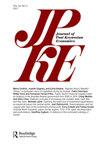Conventions in Keynes’s theory of goods markets: investment and production decisions
IF 1
3区 经济学
Q4 ECONOMICS
引用次数: 0
Abstract
Abstract The role of conventions in Keynes’s theory has been controversial. When dealing with investment and production decisions, Keynes referred to a projective rule that is his main example of convention. In addition, conventions appear in the practical techniques that Keynes attributed to agents concerned with the accumulation of wealth. Two important points have been neglected in existing interpretations. First, all these practical rules are directly present in goods markets and are not just rules used in financial markets that possibly influence agents in goods markets. Second, Keynes’s conventions in investment decisions are characterized by two properties: conformity with conformity and arbitrariness. The mechanisms underlying conformity with conformity include informational differences and possibly epistemic legitimacy, but, in contrast to Keynes’s discussion of financial markets, not a coordination effect with self-fulfilling prophecies. Those two properties are not clear in the case of production decisions.凯恩斯商品市场理论中的惯例:投资和生产决策
惯例在凯恩斯理论中的作用一直存在争议。在处理投资和生产决策时,凯恩斯提到了一条投影规则,这是他关于惯例的主要例子。此外,凯恩斯将惯例归因于关注财富积累的代理人的实用技术。现有的解释忽略了两个要点。首先,所有这些实际规则都直接存在于商品市场中,而不仅仅是金融市场中使用的可能影响商品市场代理人的规则。第二,凯恩斯投资决策惯例具有两个特征:一致性与一致性和任意性。一致性与一致性背后的机制包括信息差异和可能的认知合法性,但与凯恩斯对金融市场的讨论相反,这不是与自我实现预言的协调效应。在生产决策的情况下,这两个特性并不明确。
本文章由计算机程序翻译,如有差异,请以英文原文为准。
求助全文
约1分钟内获得全文
求助全文
来源期刊

Journal of Post Keynesian Economics
ECONOMICS-
CiteScore
1.70
自引率
10.00%
发文量
23
期刊介绍:
The Journal of Post Keynesian Economics is a scholarly journal of innovative theoretical and empirical work that sheds fresh light on contemporary economic problems. It is committed to the principle that cumulative development of economic theory is only possible when the theory is continuously subjected to scrutiny in terms of its ability both to explain the real world and to provide a reliable guide to public policy.
 求助内容:
求助内容: 应助结果提醒方式:
应助结果提醒方式:


